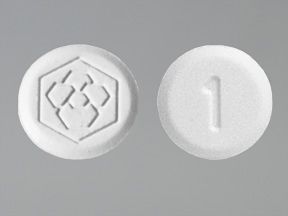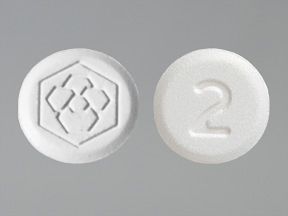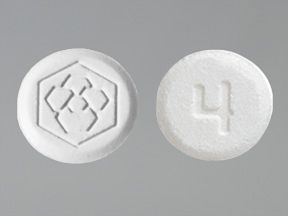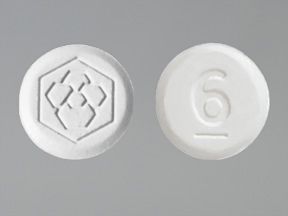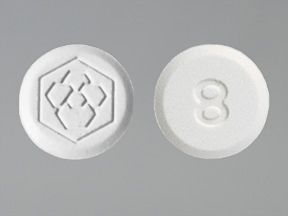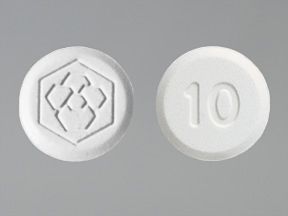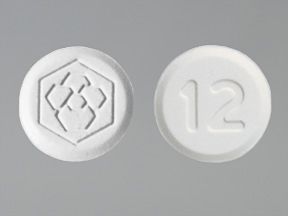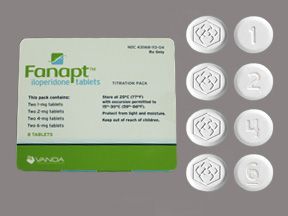Fanapt is a brand-name oral tablet prescribed for schizophrenia. Fanapt contains the active drug iloperidone.
Fanapt is FDA-approved to treat schizophrenia in adults. It’s typically only prescribed if other treatment options for schizophrenia can’t be used or haven’t been helpful. There are two main reasons for this:
- Use of Fanapt is associated with QT prolongation (a type of abnormal heart rhythm). Other treatment options may not carry this risk.
- Fanapt needs to be taken starting at a low dose and slowly increased according to your doctor’s instructions. Because of this, there may be a delay of 1 to 2 weeks before Fanapt starts working to manage the symptoms of schizophrenia. Other treatment options may start working quicker than this.
Drug details
You’ll find key information about Fanapt below.
- Drug class: second-generation atypical antipsychotic
- Drug form: oral tablet
- Generic available? No
- Prescription required? Yes
- Controlled substance? No
- Year of FDA approval: 2009
Fanapt is available only as a brand-name medication. It’s not currently available in generic form.
A generic drug is an exact copy of the active drug in a brand-name medication. Generics usually cost less than brand-name drugs.
Fanapt can cause mild or serious side effects. The following lists contain some of the key side effects that may occur while taking Fanapt. These lists do not include all possible side effects.
For more information about the possible side effects of Fanapt, talk with your doctor or pharmacist. They can give you tips on how to manage any side effects that may be concerning or bothersome.
Note: The Food and Drug Administration (FDA) tracks side effects of drugs it has approved. If you’d like to notify the FDA about a side effect you’ve had with Fanapt, you can do so through MedWatch.
Mild side effects
Below is a partial list of mild side effects of Fanapt. To learn about other mild side effects, talk with your doctor or pharmacist, or view Fanapt’s prescribing information.
Mild side effects of Fanapt can include:
- dizziness
- dry mouth
- fatigue
- stuffy nose
- sleepiness
- weight gain or weight loss
- pain or stiffness in your joints or muscles
- diarrhea
- abdominal pain
- changes in your body movements, such as slow movement, unsteadiness, or tremor
- restlessness
- urinary incontinence (when you cannot prevent urine from leaking out)
- sexual side effects, such as erectile dysfunction and difficulty with ejaculation
- mild allergic reaction*
Most of these side effects may go away within a few days to a couple of weeks. However, if they become more severe or don’t go away, talk with your doctor or pharmacist.
* For more information about allergic reaction and Fanapt, see “Allergic reaction” below.
Serious side effects
Serious side effects from Fanapt aren’t common, but they can occur. Call your doctor right away if you have serious side effects. Call 911 or your local emergency number if your symptoms feel life threatening or if you think you’re having a medical emergency.
Serious side effects and their symptoms can include:
- Orthostatic hypotension (a drop in blood pressure that occurs when you stand up). Symptoms can include:
- dizziness
- fainting
- falling, which may result in fractures or other injuries
- Changes in your heart rate or rhythm, including tachycardia (rapid heart rate) or long QT syndrome (a condition that causes a slight, abnormal pause between your heartbeats). Signs and symptoms can include:
- rapid heartbeat
- dizziness
- palpitations
- syncope (fainting)
- Changes in your metabolism that may lead to serious health problems. These changes can include:
- hyperglycemia (high blood sugar level), which may increase the risk of diabetes or its complications
- dyslipidemia (changes in blood cholesterol levels), such as high cholesterol
- significant weight gain
- Hyperprolactinemia (high level of prolactin, a type of hormone). Symptoms can include:
- galactorrhea (nipple discharge unrelated to breast milk) in females*
- gynecomastia (enlarged breast tissue) in males*
- Blood disorders, such as anemia (low level of red blood cells) and leukopenia (low level of leukocytes, a type of white blood cell). These conditions may cause:
- fatigue
- fever
- frequent or serious infections
- Priapism, (a persistent erection of the penis). Symptoms may include:
- a painful erection that won’t go away
- an erection that lasts for more than 4 hours
- permanent tissue damage, if not treated right away
- Changes in your cognitive (thinking) and motor (movement) function. This may affect your ability to safely drive or operate machinery.
- Tardive dyskinesia (movement problems sometimes caused by antipsychotic drugs). Symptoms can include abnormal, repeated movements that you can’t stop, such as:
- jaw movements
- lip smacking
- sticking out your tongue
- Neuroleptic malignant syndrome, a potentially life threatening reaction to an antipsychotic drug (also called “neuroleptic” drugs). Symptoms may include:
- changes in your heart rate or blood pressure
- high fever
- confusion
- rigid muscles
- increased sweating
- Seizures.
- Risk of suicidal thoughts or behaviors.
- Problems with how your body regulates core body temperature.
- Dysphagia (trouble swallowing), which can lead to aspiration pneumonia (a lung infection that occurs after inhaling foods or liquids instead of swallowing them).
- Increased risk of death in certain adults.†
- Severe allergic reaction.‡
* Sex and gender exist on spectrums. Use of the terms “male” and “female” in this article refers to sex assigned at birth.
† Fanapt has a
‡ For details about allergic reaction and Fanapt, see “Allergic reaction” below.
Suicide prevention
If you know someone at immediate risk of self-harm, suicide, or hurting another person:
- Ask the tough question: “Are you considering suicide?”
- Listen to the person without judgment.
- Call 911 or the local emergency number, or text TALK to 741741 to communicate with a trained crisis counselor.
- Stay with the person until professional help arrives.
- Try to remove any weapons, medications, or other potentially harmful objects.
If you or someone you know is having thoughts of suicide, a prevention hotline can help. The 988 Suicide and Crisis Lifeline is available 24 hours a day at 988. During a crisis, people who are hard of hearing can use their preferred relay service or dial 711 then 988.
Allergic reaction
As with most drugs, some people can have an allergic reaction after taking Fanapt. This side effect wasn’t reported in clinical trials of Fanapt but has occurred since the drug was approved.
Symptoms of a mild allergic reaction can include:
A more severe allergic reaction is rare but possible. Symptoms of a severe allergic reaction can include:
- swelling under your skin, typically in your eyelids, lips, hands, or feet
- swelling of your tongue, mouth, or throat
- trouble breathing
Call your doctor right away if you have an allergic reaction to Fanapt, as the reaction could become severe. Call 911 or your local emergency number if your symptoms feel life threatening or if you think you’re having a medical emergency.
The Food and Drug Administration (FDA) approves prescription drugs such as Fanapt to treat certain conditions.
Fanapt for schizophrenia
Fanapt is FDA-approved to treat schizophrenia in adults.
Fanapt is typically only prescribed if other treatment options for schizophrenia can’t be used or haven’t been helpful. There are two main reasons for this:
- Use of Fanapt is associated with QT prolongation (an abnormal heart rhythm seen on a heart monitor test called an electrocardiogram). Other treatment options may not carry this risk.
- Fanapt needs to be taken starting at a low dose and slowly increased according to your doctor’s instructions. Because of this, there may be a delay of 1 to 2 weeks before Fanapt starts working to manage the symptoms of schizophrenia. Other treatment options may start working quicker than this.
Your doctor can tell you more about the potential risks and benefits of Fanapt to treat your schizophrenia.
Schizophrenia explained
Schizophrenia is a chronic mental health condition that can be severe. It’s most commonly diagnosed when a person is a teenager or young adult.
Symptoms of schizophrenia can include:
- paranoia (feeling like others are out to get you)
- hallucinations (seeing things or hearing voices that aren’t really there)
- delusions (false beliefs)
- trouble organizing thoughts and completing tasks
- lack of emotion
- unusual behavior
Currently, there’s no known cure for schizophrenia. It’s a chronic condition, which means it doesn’t go away. Antipsychotic drugs such as Fanapt are available to lessen the symptoms of schizophrenia. It may take time for you and your doctor to find the right treatment plan for you.
Learn more about schizophrenia by visiting our mental health hub.
Effectiveness for schizophrenia
In clinical trials, Fanapt was shown to be effective for treating schizophrenia in adults.
Treatment guidelines from the American Psychiatric Association include antipsychotics as the preferred treatment for schizophrenia. (Fanapt belongs to a class of drugs called antipsychotics.) However, Fanapt is typically only prescribed if other treatment options for schizophrenia can’t be used or haven’t been helpful.
If you have questions about what to expect from Fanapt treatment, talk with your doctor.
Fanapt and children
Fanapt is FDA-approved for use in adults (ages 18 years and older) with schizophrenia. It’s not known if Fanapt is safe or effective in children or adolescents with this condition.
As with all medications, the cost of Fanapt can vary. The actual price you’ll pay, including the monthly cost and cost per year, depends on your insurance plan, your location, and the pharmacy you use.
Keep in mind that you may be able to get a 90-day supply of Fanapt. If approved by your insurance company, getting a 90-day supply of the drug could reduce your number of trips to the pharmacy and help lower the cost. If you’re interested in this option, check with your doctor, pharmacist, or insurance company.
Before approving coverage for Fanapt, your insurance company may require you to get prior authorization. This means that your doctor and insurance company will need to communicate about your prescription before the insurance company will cover the drug. The insurance company will review the prior authorization request and decide if the drug will be covered.
If you’re not sure if you’ll need to get prior authorization for Fanapt, contact your insurance company.
Financial and insurance assistance
If you need financial support to pay for Fanapt, or if you need help understanding your insurance coverage, help is available.
A savings card is available for Fanapt. For more information and to find out if you’re eligible for support, call 866-318-1969 or visit the program website.
To learn more about saving money on prescriptions, check out this article.
Mail-order pharmacies
Fanapt may be available through a mail-order pharmacy. Using this service may help lower the drug’s cost and allow you to get your medication without leaving home.
If recommended by your doctor, you may be able to receive a 90-day supply of Fanapt, so there’s less concern about running out of the medication. If you’re interested in this option, check with your doctor, pharmacist, or insurance company. Some Medicare plans may help cover the cost of mail-order medications.
If you don’t have insurance, you can ask your doctor or pharmacist about online pharmacy options.
Generic version
Fanapt is not available in a generic form. A generic drug is an exact copy of the active drug in a brand-name medication. Generics tend to cost less than brand-name drugs.
The Fanapt dosage your doctor prescribes will depend on several factors. These include:
- the severity of the condition you’re taking Fanapt to treat
- other medical conditions you may have
- other medications you may be taking
Typically, your doctor will start you on a low dosage. Then they’ll adjust it over time to reach the amount that’s right for you. Your doctor will ultimately prescribe the smallest dosage that provides the desired effect.
The following information describes dosages that are commonly used or recommended. However, be sure to take the dosage your doctor prescribes for you. Your doctor will determine the best dosage to fit your needs.
Drug forms and strengths
Fanapt comes as an oral tablet. It’s available in seven strengths:
- 1 milligram (mg)
- 2 mg
- 4 mg
- 6 mg
- 8 mg
- 10 mg
- 12 mg
Dosage for schizophrenia
Fanapt treatment must be titrated. This means you’ll start with a low dosage that will be increased each day for the first 4 to 7 days. This helps your body get used to the drug and helps to minimize certain side effects.
Your doctor will likely prescribe a Fanapt Starter Pack to help you keep track of your doses for the first 4 days. The typical recommended starting dosage of Fanapt is as follows.
| Day | Typical Dosage Instructions |
| 1 | 1 mg taken twice per day |
| 2 | 2 mg taken twice per day |
| 3 | 4 mg taken twice per day |
| 4 | 6 mg taken twice per day |
Thereafter, your doctor may have you continue taking 6 mg of Fanapt twice per day. This would be your maintenance (ongoing) dosage.
Or, in some cases, your doctor may continue to increase your dosage. These increases may occur each day for up to 3 more days, according to your doctor’s instructions. The typical maintenance dosage of Fanapt is 6 mg to 12 mg taken twice per day.
The maximum dosage is 12 mg taken twice per day (total of 24 mg per day).
Your doctor may prescribe a different dosage for you depending on several factors. Examples include whether you take certain other medications or have a particular drug metabolism problem. If you have questions about the dosage that’s right for you, talk with your doctor.
What if I miss a dose?
If you miss a dose of Fanapt, take the missed dose as soon as possible. However, if it’s almost time for your next dose, skip the missed dose and continue your regular dosing schedule. You should not take extra doses to make up for missed doses.
Contact your doctor if you’re not sure what to do after missing a dose of Fanapt. You should also contact your doctor if it’s been more than 3 days since you took a dose of the drug. They may prescribe a lower dose, then increase your amount each day until you reach your usual dosage.
To help make sure that you don’t miss a dose, try using a medication reminder. This can include setting an alarm or using a timer. You could also download a reminder app on your phone.
Will I need to use this drug long term?
Fanapt is meant to be taken as a long-term treatment. If you and your doctor determine that Fanapt is safe and effective for you, you’ll likely take it long term.
Here are answers to some frequently asked questions about Fanapt.
Is Fanapt prescribed for anxiety?
No, Fanapt is typically prescribed for schizophrenia. The Food and Drug Administration (FDA) hasn’t approved Fanapt for relieving anxiety or treating anxiety disorders.
Fanapt belongs to a group of drugs known as antipsychotics. In some cases, doctors may prescribe other antipsychotic drugs off-label* for anxiety. For example, quetiapine (Seroquel) is sometimes prescribed for treatment-resistant generalized anxiety disorder. (Treatment-resistant means that treatments you’ve tried in the past haven’t worked well for your condition.)
* Off-label drug use is when an FDA-approved drug is prescribed for a purpose other than what it’s approved for.
What drug class does Fanapt belong to?
Fanapt is an oral tablet that belongs to a drug class called atypical antipsychotics or simply “antipsychotics.” Specifically, Fanapt is a second-generation atypical antipsychotic.
Examples of other oral second-generation atypical antipsychotics include:
If you have questions about antipsychotic drugs, talk with your doctor or pharmacist.
Should I avoid exposure to heat while I’m taking Fanapt?
Typically, your body keeps your core body temperature steady even if you’re exposed to extreme heat. However, taking antipsychotic drugs, such as Fanapt, may interfere with your body’s ability to regulate its own temperature. Because of this, people taking antipsychotic drugs are at risk for hyperthermia (elevated body temperature). Types of hyperthermia, such as heat exhaustion and heatstroke, can be life threatening.
While this side effect hasn’t been specifically reported with Fanapt, it has occurred with other drugs in the same class. So, people taking Fanapt should take precautions to avoid becoming overheated. A few tips include:
- When you can’t avoid exposure to extreme heat, wear a hat and light-colored clothing made of breathable fabric such as cotton or linen.
- Drink plenty of fluids while limiting coffee and other caffeinated drinks to help prevent dehydration.
- Avoid strenuous exercise during the hottest time of the day. Instead, plan your workouts in the morning or evening when it’s generally cooler.
Talk with your doctor for more details on preventing or managing the possible side effects of Fanapt.
You should not consume alcohol while taking Fanapt.
Alcohol may increase the risk of certain side effects of Fanapt or make them worse. Examples include sleepiness and changes in your cognitive (thinking) and motor (movement) function.
Also, drinking alcohol may worsen certain symptoms of schizophrenia, such as hallucinations (seeing things or hearing voices that aren’t really there) and delusions (false beliefs). Keep in mind that Fanapt is used to treat schizophrenia.
Additionally,
If you drink alcohol and have questions about drinking it with your condition, talk with your doctor.
Fanapt can interact with several other medications. It can also interact with certain supplements as well as certain foods.
Different interactions can cause different effects. For instance, some interactions can interfere with how well a drug works. Other interactions can increase side effects or make them more severe. Drug-condition interactions can also cause certain effects. For information about these interactions, see the “Fanapt precautions” section below.
Fanapt and other medications
Below is a list of medications that can interact with Fanapt. This list does not contain all drugs that may interact with Fanapt.
Before taking Fanapt, talk with your doctor and pharmacist. Tell them about all prescription, over-the-counter, and other drugs you take. Also tell them about any vitamins, herbs, and supplements you use. Sharing this information can help you avoid potential interactions.
Drugs known to cause QT prolongation. Taking certain drugs with Fanapt may increase the risk of QT prolongation (a type of abnormal heart rhythm) or long QT syndrome (a type of heart rhythm change).
These side effects could lead to serious or even life threatening heart problems. So, your doctor may not prescribe these drugs together. Examples of drugs associated with QT prolongation include:
- class 1A antiarrhythmic drugs, such as:
- procainamide
- quinidine
- class III antiarrhythmic drugs, such as:
- sotalol (Betapace AF)
- amiodarone (Pacerone)
- certain antibiotics, such as moxifloxacin
- certain other antipsychotic drugs, such as:
- chlorpromazine
- thioridazine
- methadone (Methadose), an opioid medication
- pentamide (Pentam), an antiparasitic drug
Drugs that cause sedation (sleepiness). Fanapt may cause sleepiness. Taking certain other drugs with Fanapt could make this side effect worse and cause a level of sedation that may not be safe. Examples of drugs that cause sleepiness include:
- drugs used to treat insomnia (trouble sleeping), such as:
- benzodiazepines, such as:
- other antipsychotic drugs, such as:
- risperidone (Risperdal)
- olanzapine (Zyprexa)
- certain antidepressants, such as:
- mirtazapine (Remeron)
- trazodone
Drugs that affect the way your body metabolizes (breaks down) Fanapt. Certain drugs may interfere with how your body metabolizes (breaks down) drugs, including Fanapt. Healthcare professionals refer to these drugs as “strong CYP2D6 inhibitors” and “strong CYP3A4 inhibitors.”
Taking these drugs while taking Fanapt increases the risk of Fanapt’s side effects. So, if your doctor prescribes these types of drugs while you’re taking Fanapt, they’ll likely lower your dose of Fanapt. Examples of these drugs include:
- certain antifungal drugs, such as:
- ketoconazole
- itraconazole (Sporanox)
- certain antidepressants, such as:
- fluoxetine (Prozac)
- paroxetine (Paxil)
Drugs used to lower blood pressure. Fanapt may cause orthostatic hypotension (a drop in blood pressure that occurs when you stand up). Taking drugs that lower blood pressure could further increase your risk of this side effect. Examples of blood pressure medications include:
- alpha-blockers, such as doxazosin (Cardura)
- angiotensin converting enzyme (ACE) inhibitors, such as lisinopril (Zestril)
- angiotensin II receptor blockers (ARBs), such as telmisartan (Micardis)
- beta-blockers, such as bisoprolol (Bystolic)
If you have questions about drug interactions that may affect you, ask your doctor or pharmacist.
Fanapt and herbs and supplements
There aren’t any herbs or supplements that have been specifically reported to interact with Fanapt. However, you should still check with your doctor or pharmacist before using any of these products while taking Fanapt.
Fanapt and foods
There aren’t any foods that have been reported to interact with Fanapt. It’s possible that grapefruit or grapefruit juice might interact with Fanapt, but this hasn’t been specifically studied.
If you have any questions about eating certain foods with Fanapt, talk with your doctor.
You should take Fanapt according to the instructions your doctor gives you.
When to take
Fanapt is taken twice per day. You’ll take one tablet in the morning and one tablet in the evening. Your doctor may tell you to take the drug at specific times of day. You can take Fanapt with or without food.
Taking your doses on a consistent schedule helps keep a steady level of the drug in your body. This helps Fanapt work effectively.
To help make sure that you don’t miss a dose, try using a medication reminder. This can include setting an alarm or using a timer. You could also download a reminder app on your phone.
Accessible labels and containers
If your prescription label is hard to read, talk with your doctor or pharmacist. Some pharmacies offer labels that have large print, braille, or a code you scan with a smartphone to convert text to speech. If your local pharmacy doesn’t have these options, your doctor or pharmacist may be able to direct you to one that does.
If you have trouble opening medication bottles, ask your pharmacist if they can put Fanapt in an easy-open container. They also may be able to recommend tools that can make it simpler to open lids.
Taking Fanapt with food
You can take Fanapt with or without food.
Can Fanapt be crushed, split, or chewed?
No, Fanapt tablets should not be crushed, spilt, or chewed. Fanapt tablets should be swallowed whole.
If you have trouble swallowing pills, talk with your doctor. They may recommend a different treatment option for you.
Fanapt is used to treat schizophrenia in adults. How Fanapt works to treat schizophrenia isn’t known for sure. The drug is thought to work in the brain by increasing the availability of certain neurotransmitters (chemical messengers). These include serotonin and dopamine.
People with schizophrenia are thought to have an imbalance of these neurotransmitters. This prevents brain cells from communicating properly. These imbalances may play a role in the development of schizophrenia and its related symptoms.
Antipsychotic drugs, such as Fanapt, are thought to help balance these neurotransmitters. This may help improve communication between brain cells and lessen the symptoms of schizophrenia.
How long does it take to work?
Fanapt may take 1 to 2 weeks to start reducing the symptoms of schizophrenia. Even if you start feeling better, you should continue taking the medication as prescribed by your doctor. Fanapt is typically used long-term to manage your condition and help prevent the symptoms from coming back.
It’s not known if it’s safe to take Fanapt during pregnancy. Limited information is available regarding the safety of Fanapt use during pregnancy.
Some evidence showed that extrapyramidal symptoms (EPS) occurred in babies exposed to antipsychotic drugs during the third trimester of pregnancy. Note that Fanapt belongs to this drug class but it wasn’t specifically studied. (EPS are a group of symptoms sometimes caused by antipsychotic drugs. Examples of EPS are rigid muscles, fever, and movement problems.)
Also, withdrawal symptoms have occurred after birth in newborns whose mothers took antipsychotics during the third trimester of pregnancy. Reported symptoms included excessive drowsiness, tremor, and trouble feeding or breathing.
Be sure to tell your doctor if you’re pregnant or planning to become pregnant. They can provide more information about the risks of Fanapt use during pregnancy.
If you become pregnant during Fanapt treatment, tell your doctor. They may suggest participating in the National Pregnancy Registry for antipsychotic drugs. This registry helps people learn more about how exposure to these drugs may affect pregnancy outcomes. For more information, you can call this registry at 866-961-2388 or visit the website.
Fanapt and fertility
It’s not known if Fanapt affects fertility. In animal studies, iloperidone (the active ingredient in Fanapt) was found to reduce fertility in male and female rats. However, the findings of animal studies don’t always predict what could happen in humans.
If you have questions about how Fanapt may affect your fertility, talk with your doctor.
It’s not known if Fanapt is safe to take during pregnancy. If you’re sexually active and you or your partner can become pregnant, talk with your doctor about your birth control needs while you’re using Fanapt.
For more information about taking Fanapt during pregnancy, see the “Fanapt and pregnancy” section above.
Your doctor will likely recommend not breastfeeding a child while taking Fanapt. There isn’t any information available regarding the effects of the drug on breast milk or a child who is breastfed.
In animal studies, the drug passed into the milk of lactating rats.
Due to the possibility of Fanapt passing into breast milk, doctors typically recommend other healthy ways to feed a child while taking this medication.
If you’re breastfeeding or planning to breastfeed, talk with your doctor before taking Fanapt.
This drug comes with several precautions. These are considered drug-condition interactions.
FDA warning: Increased risk of death in certain older adults
This drug has a
Increased risk of death in certain older adults. Antipsychotic drugs, such as Fanapt, may increase the risk of death when used to treat psychosis related to dementia in adults ages 65 years and older.
Because of this risk, doctors likely won’t prescribe Fanapt to treat psychosis in older adults with dementia.
Other precautions
Before taking Fanapt, talk with your doctor about your health history. Fanapt may not be right for you if you have certain medical conditions or other factors affecting your health. These include:
- Liver problems. If you have liver problems, talk with your doctor. They may check your liver function before prescribing Fanapt. They may give you a lower dose if they find that your liver problems are moderate in severity. Fanapt is not recommended for people with severe liver problems.
- Drug metabolism problem. Fanapt is metabolized (broken down) in your body by an enzyme called CYP2D6. Some people have problems with this enzyme that prevent their body from breaking down the drug. This increases the level of the drug in your body and raises the risk of Fanapt’s side effects. Doctors may call this being a “poor metabolizer of CYP2D6.” Talk with your doctor if you’ve been told you have this problem. They’ll likely prescribe a lower dose of Fanapt for you.
- Long QT syndrome or risk factors for QT prolongation. Rarely, changes in heart rate or rhythm may occur in people taking Fanapt. Specifically, some people have congenital long QT syndrome or have developed QT prolongation. “Long QT” refers to an abnormal pause between your heart beats. Certain factors or conditions may increase the risk of having this side effect from Fanapt.
Talk with your doctor if you have congenital long QT syndrome before starting treatment with Fanapt. You should also let your doctor know if you have low levels of potassium or magnesium, heart problems such as heart failure, or a problem metabolizing an enzyme called CYP2D6. Your doctor can help determine if it’s safe for you to take Fanapt or whether another medication might be a better option for you. - Diabetes. Fanapt can cause hyperglycemia (high blood sugar levels). If you have diabetes, taking this drug may make your condition harder to manage. This may increase the risk of diabetes complications. Your doctor may have you monitor your blood sugar levels often while you take Fanapt. They may also adjust your diabetes treatment plan.
- Heart or blood pressure problems. Antipsychotic drugs, such as Fanapt, may affect your heart rate or rhythm. This drug may also cause changes in blood pressure. If you already have a heart problem, high blood pressure, or low blood pressure, talk with your doctor. They’ll help determine if Fanapt may be a safe treatment option for you.
- Cholesterol problems. Fanapt can affect blood cholesterol levels. If you already have cholesterol problems, such as high cholesterol, taking this drug may make it worse. This can increase your risk of related complications. Your doctor will monitor your cholesterol levels regularly while you take Fanapt. They may also prescribe additional cholesterol medications.
- Seizure disorder. Fanapt may increase your risk of seizures. If you have a history of seizures, talk with your doctor before they prescribe Fanapt. They’ll help determine if it’s safe for you to take it.
- Dehydration risk. Antipsychotic drugs, such as Fanapt, may affect how your body regulates its temperature. This can increase the risk of dehydration. If you’re already prone to becoming dehydrated, talk with your doctor. They’ll help determine if it’s safe for you to take this medication.
- Risk of stroke in older adults with psychosis related to dementia. Antipsychotic drugs, such as Fanapt, may increase the risk of stroke when used to treat psychosis related to dementia in adults ages 65 years and older. (Psychosis is a condition that cause you to lose touch with reality.) Fanapt is not approved for this use. And, because of this risk, doctors likely won’t prescribe Fanapt to older adults with psychosis and dementia.
- Allergic reaction. If you’ve had an allergic reaction to Fanapt or any of its ingredients, your doctor will likely not prescribe Fanapt. Ask your doctor what other medications may be better options for you.
- Pregnancy. It’s not known if Fanapt is safe to take during pregnancy. For more information, see the “Fanapt and pregnancy” section above.
- Breastfeeding. It’s not known if Fanapt is safe to take while breastfeeding a child. For more information, see the “Fanapt and breastfeeding” section above.
Note: For more information about the potential negative effects of Fanapt, see the “Fanapt side effects” section above.
Using more than the recommended dosage of Fanapt can lead to serious side effects. Do not use more Fanapt than your doctor recommends. (For information on the recommended dosages of Fanapt, see the “Fanapt dosage” section above.)
Overdose symptoms
Symptoms of an overdose can include:
- long QT syndrome, a condition that causes a slight, abnormal pause between heartbeats
- excessive drowsiness
- rapid heart rate
- hypotension (low blood pressure)
- extrapyramidal symptoms (EPS, a group of symptoms that can occur in people taking antipsychotics), such as:
What to do in case of overdose
If you think you’ve taken too much of this drug, call your doctor. You can also call America’s Poison Centers at 800-222-1222 or use its online tool. However, if your symptoms are severe, call 911 or your local emergency number, or go to the nearest emergency room right away.
When you get Fanapt from the pharmacy, the pharmacist will add an expiration date to the label on the bottle or packaging. This date is typically 1 year from the date they dispensed the medication.
The expiration date helps guarantee that the medication is effective during this time. The
Storage
How long a medication remains good to use can depend on many factors, including how and where you store the medication.
Fanapt tablets should be stored at room temperature in a tightly sealed container away from light. If needed, Fanapt may be temporarily stored at temperatures of 15°C to 30°C (59°F to 86°F). Avoid storing this medication in areas where it could get damp or wet, such as bathrooms.
Disposal
If you no longer need to take Fanapt and have leftover medication, it’s important to dispose of it safely. This helps prevent others, including children and pets, from taking the drug by accident. It also helps keep the drug from harming the environment.
This article provides several useful tips on medication disposal. You can also ask your pharmacist for information about how to dispose of your medication.
Disclaimer: Medical News Today has made every effort to make certain that all information is factually correct, comprehensive, and up to date. However, this article should not be used as a substitute for the knowledge and expertise of a licensed healthcare professional. You should always consult your doctor or another healthcare professional before taking any medication. The drug information contained herein is subject to change and is not intended to cover all possible uses, directions, precautions, warnings, drug interactions, allergic reactions, or adverse effects. The absence of warnings or other information for a given drug does not indicate that the drug or drug combination is safe, effective, or appropriate for all patients or all specific uses.

